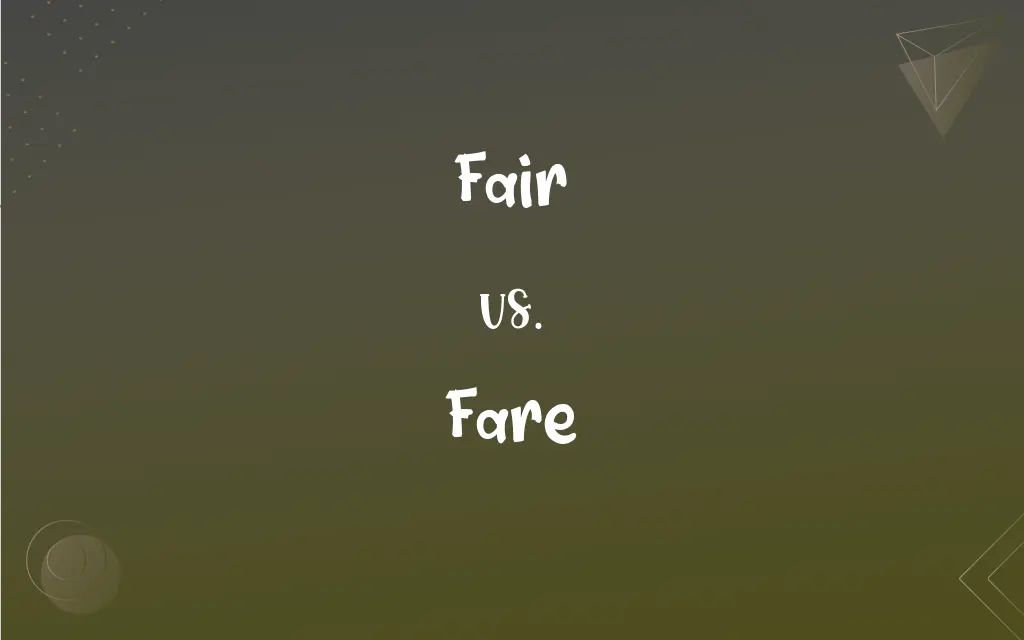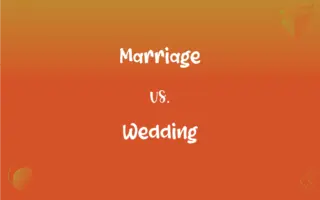Fair vs. Fare: What's the Difference?
Edited by Aimie Carlson || By Harlon Moss || Updated on October 19, 2023
"Fair" primarily refers to justice or appearance, while "fare" denotes a cost for transportation or how someone is doing.

Key Differences
The word "fair" is versatile in the English language, often used to describe something that is just, equitable, or pleasing in appearance. On the other hand, "fare" commonly pertains to the cost of transportation, such as a bus or train ticket.
In many contexts, "fair" can relate to an event where goods or services are displayed for sale, like a book fair or a science fair. Contrarily, "fare" can also mean to perform in a specified way in a particular situation or over a particular period.
When speaking about weather, one might describe it as "fair" if it's clear and pleasant. However, "fare" in a similar vein can ask about someone's well-being or condition, such as inquiring, "How did you fare?"
"Fair" also has connotations in terms of honesty. When someone plays a game by the rules, we might say they play "fair." In contrast, "fare" can relate to a range of food served at a meal or on a menu, highlighting its versatility beyond transportation.
A "fair" complexion refers to a light skin tone, often emphasizing beauty or clarity. "Fare," distinctively, can describe a person's journey or progress through a particular experience or period of life.
ADVERTISEMENT
Comparison Chart
Primary Meaning
Just, equitable, or pleasing in appearance
Cost for transportation or one's well-being
Examples of Usage
Fair game, fair complexion
Bus fare, daily fare
Type of Word
Adjective, noun
Noun, verb
Associated Contexts
Events, honesty, complexion
Transportation, performance, food
Related Idioms/Phrases
"All's fair in love and war"
"How did you fare?"
ADVERTISEMENT
Fair and Fare Definitions
Fair
Fair: Just and unbiased.
It's important to give everyone a fair chance.
Fare
The money paid for a journey on public transportation.
The bus fare has increased this month.
Fair
Fair: Pleasing to the eye; beautiful.
She has a fair complexion with rosy cheeks.
Fare
Perform in a specified way.
How did you fare in your interview?
Fair
Fair: An event at which goods are displayed and sold.
We bought local crafts at the county fair.
Fare
A person's condition or how something progresses.
With proper care, he will fare well.
Fair
Fair: Clear and sunny weather.
The forecast promises a fair day tomorrow.
Fare
To travel.
She will fare forth on her adventure tomorrow.
Fair
Fair: In accordance with the rules or standards.
He plays a fair game without cheating.
Fare
A range of food or dishes.
The restaurant's fare is mostly Italian.
Fair
Of pleasing appearance, especially because of a pure or fresh quality; comely.
Fare
To get along
How are you faring with your project?.
Fare
To happen or develop
How does it fare with you?.
FAQs
When might one use "fair" to describe the weather?
One might use "fair" for clear and sunny weather, whereas "fare" doesn't describe weather.
What's the meaning of "fair play"?
"Fair play" denotes honesty and justness, while "fare" doesn't have a related phrase.
What does "fair" typically denote?
"Fair" usually denotes something just, equitable, or aesthetically pleasing, unlike "fare" which pertains to transportation costs.
Can "fare" describe a type of food?
Yes, "fare" can mean a range of food served, while "fair" doesn't have this connotation.
How is "fare" related to public transportation?
"Fare" is the money paid for journeys on public transport, while "fair" doesn't denote this.
What does "fair" mean in the context of complexion?
In complexion, "fair" refers to a light and clear skin tone, not to be confused with "fare."
Can "fair" describe an event?
Yes, "fair" can describe events like book fairs, unlike "fare."
Can "fair" refer to beauty standards?
Yes, "fair" can allude to beauty, especially in terms like "fair maiden," unlike "fare."
Is "farewell" related to "fare"?
Yes, "farewell" means "goodbye" and is derived from "fare" meaning to travel or proceed.
Is "fair" always about justice?
While "fair" often connotes justice, it can also relate to appearance, weather, and events, unlike "fare."
Is "fair" always positive in connotation?
Not always. While "fair" often has positive meanings, contexts like "fair warning" can be neutral or negative. "Fare" doesn't have such variations.
Does "fair" have a legal connotation?
Yes, "fair" can relate to legal matters, like "fair trial," whereas "fare" doesn't.
What does "fair game" mean?
"Fair game" means a person or thing that's considered a legitimate target, not related to "fare."
Does "fare" always indicate payment?
Often in transportation, "fare" means payment, but it can also describe food, performance, or a journey, diverging from "fair."
Can "fare" be used as a verb?
Yes, "fare" can mean to perform or travel, unlike "fair."
Can "fare" indicate success?
Yes, "fare" can indicate how someone has succeeded, as in "How did she fare?" "Fair" doesn't imply this.
Can "fair" and "fare" be used interchangeably?
No, "fair" and "fare" have different meanings and are not interchangeable.
What's the connection between "fare" and well-being?
"Fare" can ask about someone's condition or progress, whereas "fair" doesn't in the same context.
Do both "fair" and "fare" derive from Old English?
Yes, both "fair" and "fare" have Old English origins, but their meanings have evolved.
Is "fare" primarily a noun?
While "fare" is commonly a noun, it can also be a verb, whereas "fair" is often an adjective or noun.
About Author
Written by
Harlon MossHarlon is a seasoned quality moderator and accomplished content writer for Difference Wiki. An alumnus of the prestigious University of California, he earned his degree in Computer Science. Leveraging his academic background, Harlon brings a meticulous and informed perspective to his work, ensuring content accuracy and excellence.
Edited by
Aimie CarlsonAimie Carlson, holding a master's degree in English literature, is a fervent English language enthusiast. She lends her writing talents to Difference Wiki, a prominent website that specializes in comparisons, offering readers insightful analyses that both captivate and inform.































































